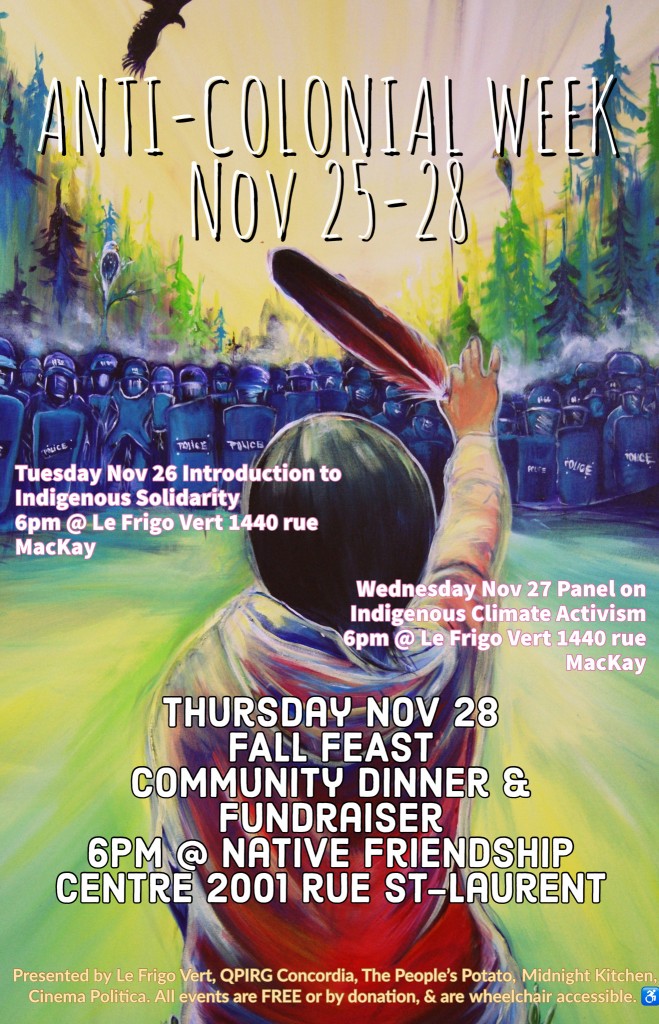
Anti-colonial Week // Workshop, Panel & Dinner // Celebrating our cultures of resistance to colonialism
–EVENT SCHEDULE– (November 25th, Nov 28th, December 2nd & Dec 3rd ):
MONDAY, NOVEMBER 25th, 7– 9:30pm (Presented by Cinema Politica Concordia)
Artifishal+ Valley Of The Southern North-Mtl premiere w/ guests
@ Cinema Politica Concordia (1455 Maisonneuve West)
THURSDAY, NOVEMBER 28th, 6:00pm-8:00pm
6-8pm @ The Native Friendship Center of Montreal
(2001 boulevard St-Laurent – métro St-Laurent – wheelchair accessible)
By donation/Pay What You Can
Everyone welcome – bring your kids!
Raffle tickets $2 or 3 for $5
Funds go towards the Native Friendship Center and Kanehsatà:ke Longhouse land defense
Doors open at 5:45pm. Dinner served at 6:30pm (meat and non-meat options!)
*Priority seating and food serving reserved for Indigenous people, children & Elders first please
Short Film Screening at 6:10pm
Biidaaban (The Dawn Comes) by Amanda Strong (2017) (18min)
Since time immemorial Indigenous people have harvested sap from trees to produce syrup a practice that continues today. Two main characters Biidaaban, a young Indigenous gender fluid person and Sabe, a Sasquatch shape shifter set out to harvest sap from Sugar Maples in their urban environment and private neighbourhoods of the city. Biidaabaan can see traces of time, people, creatures and land. By harvesting syrup in this way they are continuing of the work of their ancestors.
https://www.facebook.com/events/551896645626603/
MONDAY, December 2nd, 6:00- 8:00pm (Presented by Le Frigo Vert and QPIRG Concordia)
Intro to Indigenous Solidarity
@ Le Frigo Vert (1440 Rue Mackay)
This workshop will establish a framework and tools for understanding the context and realities faced by Indigenous peoples and communities, while problematizing common practices of solidarity by non-Native communities, organizations and peoples. Iako’tsi:rareh Amanda Lickers will guide this session that will develop participants critical thinking skills by using real-world examples of organizing relationships, campaign strategies, media stunts, events and actions using a lens of consensual vs predatory solidarity practices.
Reflecting on the realities of systemic power and privilege with a focus on the necessity of Indigenous dispossession for the continued maintenance of settlerhood on these lands, we will deepen participants understanding of best practices for engaging in Indigenous solidarity initiatives.
With an eye to harm reduction, this workshop will address how settler engagement in Indigenous communities and social movements must be rooted in an understanding of the power imbalances and impacts that entails. Encouraging personal reflection, critical thinking, and humility and willingness to incorporate relevant feedback as central to meaningful relationship building and accountability.Join us for this free workshop to learn ways to better act in solidarity with Indigenous peoples.
- About the facilitator:
Iako’tsi:rareh Amanda Lickers (she/they) is a Six Nations Seneca who grew up between urban and rural landscapes along the north shore of Lake Ontario. She is a contributor to the Land, Body, Defense Environmental Violence Tool Kit released by Native Youth Sexual Health Network in partnership with Women’s Earth Alliance. You may know her as co-founder of Reclaim Turtle Island, as a public educator and facilitator building capacity alongside many frontline land defense campaigns over the last 10 years. Throughout this time Amanda has been immersed in grassroots sovereignty work for her lands and waters against extractive industry (from the uranium fuel cycle to fracking and movement building against tar sands expansion and pipeline construction) while she continues to open her big mouth against “greenwashed” co-optation of Indigenous sovereignty movements. In her experiences enduring, witnessing and naming land trauma, Iako’tsi:rareh’s praxis is shaped by her understandings of Terra Nullius as rape culture.
If it’s about the Land, it’s about Us: A Climate Justice Panel
@ QPIRG Concordia (2100 Guy, #205)
In reflecting on the land x body connection, we will be hearing from perspectives of Indigenous women & two-spirit peoples involved in frontline struggles for our peoples, lands & waters.
In part, participants will reflect on the contemporary climate movement and the role of ENGO’s & mainstream mass mobilization efforts have in the current state of affairs. Looking to ‘Terra Nullius is rape culture’, a framework which emerged in response to ongoing environmental racism, we will be examining ways our work inter-relates across reproductive, gendered and land based sites.
Discussing themes connected to bodily sovereignty, land trauma, cultural revitalization as well as the complexities of resisting resource extraction within an environmental movement largely coopted for a future of “sustainable settler colonialism.”
Panelists To Be Confirmed Soon.
This event takes place on the traditional territory of the Kanien’kehá:ka. The island called “Montreal” is known as Tiotia:ke in the language of the Kanien’kehá:ka, and it has historically been a meeting place for other Indigenous nations, including the omàmiwininì and other Anishnaabe peoples. As an organization that centers social and environmental justice, we feel it’s crucial to be informed on the past and ongoing consequences of colonialism. We encourage everyone to learn about the history of these lands and to support Indigenous resistance here and across Turtle Island.
